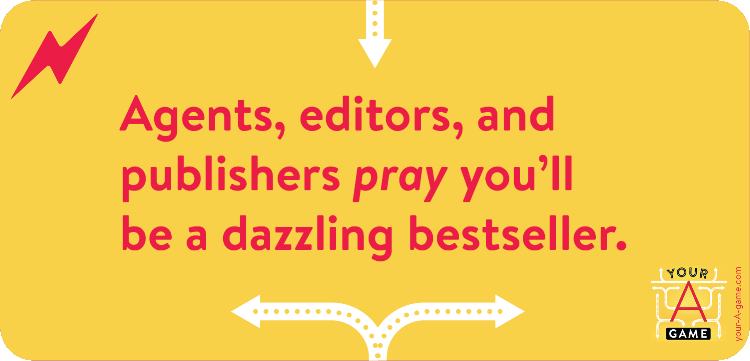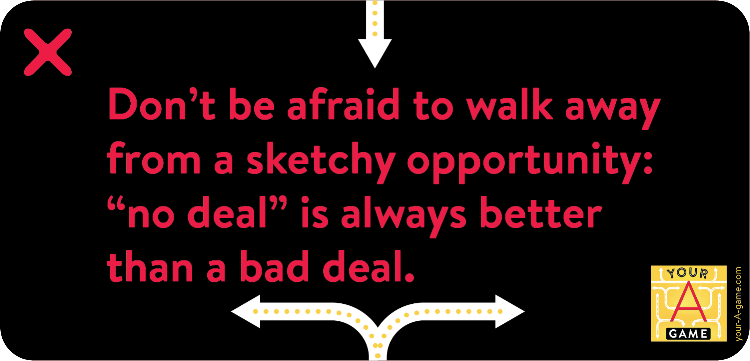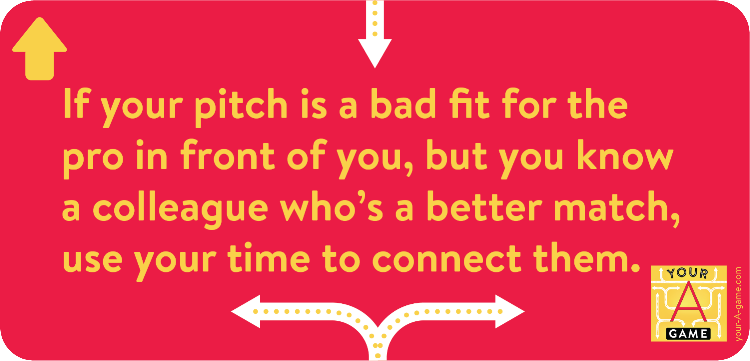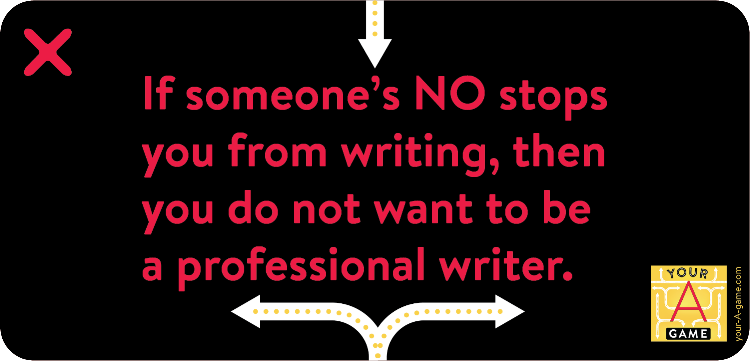Queries and pitches are scoops of the same aspirational ice cream: how to sell your story to a stranger in soundbites. Pitches do this in person and queries at a distance, but aside from mechanical concerns the goal is to boil the project’s unique appeal into a punchy, memorable amuse-bouche that no one can resist.
As with promoting a project to civilians, the pitch or query acts as a Trojan Horse to bypass their doubts, boredom, or exhaustion so that your project becomes theirs and your team gains a new ally. Unlike book promotion, the query or pitch comes long before the project hits the shelves…giving you plenty of time to polish and perfect the final product so that it fits your market when the time comes.
They are praying that your project will be the one that buys them their second home and sends their kids to Florence. Treat interactions with this colleagues as a mutual opportunity: you may find A-game teammates that can hone your brand and broaden your market, and they may find a new talent that resonates with their strengths and strategic goals within your genre.

Query Letters
Unless you attend professional events where pitching is common, your project’s first contact with a pro will probably be a query letter. Unless a company accepts unsolicited (aka slush pile) submissions, you’ll need an invitation to submit before plunking that manuscript on any desks. In simplest terms, a query is a project pitch on paper. Most queries are sent cold to publishing professionals who know nothing about you, and so bringing your A-game is the only option you’ve got. In practice, your query must accomplish several things:
- Hook their attention with wit, style, and precision.
- Summarize the extraordinary appeal of your book.
- Convey your voice and professional mastery.
- Convince them to dig deeper even if they don’t have time.
Your letter should never be more than a page. You have about 200 words to radiate charm, professionalism, and a clear sense of your brand to someone who doesn’t have three extra minutes to waste on foolishness or laziness. You want a powerful open and a sexy summary which includes your fabulous logline and a killer 1st-person query bio.
- Follow the guidelines given by the agent or publisher to the letter.
- Triple-check everything before submitting; reading aloud more than once is a must.
- Don’t repeat yourself, trim excess verbiage, and murder every single cliché like your career depends upon it.
Never attach an unsolicited document unless you’ve been given direct, explicit permission. Several successful authors advocate attaching the first five pages regardless; these tend to be people who submitted queries back in the day of paper and envelope. Today sending the first five pages is an attachment to an email, a very different thing than a few extra pieces of paper. We haven’t heard anything but disdain for unwanted attachments in the digital (and virus-soaked) age, and we don’t recommend it.
Because query letters address someone directly, they present the one exception to the third-person rule for author bios. For best results boil your 75-word bio down to 40-50 words of dazzling first-person for inclusion in all query and cold approach correspondence.
Query Basics
In correspondence, presentation counts a lot. Pay attention or else! Anything sloppy, weird, cute, or gimmicky immediately gives publishing professionals the impression that you’re a crappy writer, a creepy lunatic, and/or a rank amateur. Your letter should include:
- Simple, declarative sentences in present tense.
- A fascinating summary, a query bio, and a strong sense of your voice.
- Plain text without any wacky formatting, misspellings, typos, colors, or emoticons.
- Lots of friendly white space to lure and soothe weary eyes.
- Three to four paragraphs maximum. The plot summary should be the longest paragraph.
- Language that errs on the side of professional formality, but never send a blanket or blind query (“To Whom It May Concern...”).
- (Near the end) the word count, genre, and contact information. Your email must be professional (i.e. nickname free), unshared, and checked regularly.
Summarize the appeal
The paragraph summarizing your project is the meat of your query, and the one with the most latitude for your voice. Make the moneyshot pay off.
- Limit yourself to one or (at the absolute most) two main characters to keep things focused.
- Open with the name of your protagonist and the pivotal dramatic choice of the story.
- Don’t open with a subordinate clause. (e.g. “In a time of bloody conflict,…”)
- Establish high stakes, the obstacle, and the dire consequences looming before the protagonist.
- Concentrate on the book’s critical event, not the mood, backstory, or worldbuilding.
- Focus on events in the book’s first half to provoke interest, and never give away the ending.
- Spare them your opinions. Don’t praise your own book or insist how brilliant, hilarious, erotic, tragic, or gripping it is. Editorializing is a no-no. No one cares what you think about your own work. Eliminate every instance of “I believe…”, “I feel…”, and “I think...” Let the book speak for itself. If you don’t trust your words to do their job, they won’t.
- Never apologize or make excuses for your work. Let them form their own opinions.
- Don’t predict their possible reactions or list the benefits of reading your work.
- Don’t compare your book to other books unless you want your work to seem derivative, dated, or redundant. Books take time to make it to market which means your example is at least a couple years old (aka irrelevant or myopic).
Ditch the Gimmicks
Cutesy or self-conscious stunts to get attention will flag your letter as a waste of time.
- Quotes, clichés, and rhetorical questions stink on ice. Think of them as the query equivalent of sending this potential colleague a dirty diaper…in summer…in a windowless attic...with rats.
- Never write in first person as the protagonist or try to convey an earth-shattering “message.”
- Elaborate or stilted writing won’t impress anyone or bludgeon them into submission. Avoid figurative language and elaborate backstory. Keep it simple. A sliver of white space beats an inch of blather and hype.
By the same token, if you’ve never read through Janet Reid’s QueryShark site, you should as soon as possible...the entire thing, whenever you have a spare moment. The Shark is brilliant, gracious, and knows this business cold. Read her, learn her, love her.
EXERCISE: BOOK PITCH ON PAPER
- Using rich specifics, active verbs, and minimal modifiers, write a description of what makes your book remarkable.
- Underline all the powerful, descriptive words
- Make a list of the underlined words in order of importance to the intended audience.
- Verify that each of those words is the most impactful, accurate, and active option available. Replace any stragglers or clichés. Upgrade to verbs whenever possible.
- Use your most important words from the top of that list to write a short pitch for the book in 50 to 75 words that reveals the hook, conflict, world, and stakes in indelible strokes.
This pitch paragraph can serve as your book’s description in the queries and letters.

Pitch Sessions
In theory, a pitch session is a living query letter in which you deliver your query letter in person and then answer any questions the agent or editor might have. If you have written a dazzling query letter and read it out loud several times, you should be able to ace a pitch session without too much trouble.
In practice, formal pitch meetings are something of a relic. Back in the glory days of Big Six publishing, access to the gatekeepers could make or break a literary career. Pitch sessions at author events offered direct access to parties of influence in a strictly managed setting. As always, walking in with a clear measure of success made a world of difference.
These sessions at genre fiction events owe a great deal to the memory of million-dollar spec deals in Hollywood. You know this hoary story: unknown writer with a “heart” project dazzles the suits who pay a mint for the rights on the spot. Ironically, Hollywood hasn’t operated that way for a couple decades, but the soundbite-friendly dream lives on. Frankly, the PR value isn’t high enough to offset the tremendous risk of snap decisions involving that kind of production budget. So too in publishing. No one spends a million bucks on a whim.
While the format varies, most pitch sessions schedule writers in narrow windows of time in which they have a one-on-one convo with an agent, editor, or packager who works in their genre.
- In an ideal pitch session, the author arrives and immediately charms the hell out of the savvy pro, pitches their book in a single dazzling logline, answers questions with wit and flair and walks away with a lucrative offer that will change their career forever.
- In practice, the author gets some face time, they explain their book as best they can and most agents and editors will (at a minimum, to be polite) ask for a partial, even if they have zero interest; when face to face, a qualified “yes” is the path of least resistance.
Times have changed and while these meetings can still be useful, they can also be a waste of time unless approached properly. Are books still sold by blind pitch? Yes, obviously. But publishing has changed so drastically, both its economic model and its time frame, that the idea of a million dollar deal inked over a folding table is ridiculous.
The truth is, most pitch sessions have become a kind of formalized ritual with a murky function. They provide a real draw for newbie authors and so conventions continue to book them to bolster attendance. Events pay some or all expenses for the participating editors and agents, which allows them to travel to more cons and network with their already-contracted authors during their unscheduled downtime. And every once in a great while an actual deal gets made at the metaphoric table…keeping the dream alive. Still, winning pitches would probably have cleared the bar in any context. Stars shine, y'all.

These days, an in-person pitch meeting might be best viewed as hands-on practice for subsequent informal chats at professional gatherings. Don’t treat them as a potential home run, but as a batting cage. Pitch sessions are great practice for getting to the point and expressing your brand quickly and charismatically to publishing pros. You learn how to engage with editors and agents… to set a hook, reel them in, and flip them into the boat. You also have a chance to rehearse the small details that make a big difference: tone, appearance, modulation, approach, distillation of selling points. Practice does make perfect, and in that sense pitch sessions can be invaluable.
Because you’re physically present, make sure your brand and charms are immediately apparent. If anything, think of the pitch session as a performance of your query letter in front of a captive audience of one. You’ll be conveying the information from your standard query, but in a format which allows more direct engagement and opportunities to charm and pivot as necessary. What lands? What doesn't? What's essential and irrelevant? Skip the endless backstory or editorializing about your life, and get to your story’s dazzling hook ASAP. Keep the summary tight and punchy, engage with your audience warmly and professionally, leave them wanting more.
At some point, you will have to pitch your work either in person or in correspondence so take time to practice these skills and polish the pitch for all your projects. You never know who may turn and ask for what you’ve got to offer them.
A-game rejection
Your work will be rejected, and more than once. There’s no safe space in a career when rejection never happens. Even if you self-publish, some of your books will fail to perform no matter how hard you work to promote them and how elegantly you write them. Shit happens.
This seems like such an obvious comment, and yet every agent and editor will tell you about the people who write them back after a polite rejection and deliver screeds, insults, and sometimes outright threats. Every handful of days the Internet erupts with news of yet another author trolling Goodreads, hissing and spitting at readers who dare to give their book less than a five star review.
Rejection hurts. Rejection sucks. But remember, as personal as it is to you, your work is business to everyone else in the industry. Lashing out at those who hurt your feelings will never help you. More likely, it will damage your Brand and Presence, possibly beyond repair.
Remember too that failure and rejection instruct. Sometimes directly: put that rejection letter away until feelings aren’t so raw, then read it again. Did that agent just give you clarity on why the story doesn’t work, or where your pitch went wrong? Did that Publisher’s Weekly review help you understand something about your technique you never could get your mind around before? If your rejection isn’t specific, you might not be able to get direct insight, but especially if they pile up, go deep inside yourself to see the truths you’re not letting yourself see.
Damon’s first novel came after twenty-five years of writing for film, TV, comics and theatre. While outsiders might have believed he came “out of nowhere,” he’d spent decades in the trenches learning how to promote his work and put words on paper for money. That book landed with great fanfare because of a glorious fluke in romance publishing, which he exploited ruthlessly.
Heidi wrote novels as a hobby from age twelve to twenty-five before she began writing for publication. In 1998 she sent out her first book to a publisher, got a request for a full, and then it was nothing but utter rejection for a full decade. In those ten years, a lot of things happened. One, publishing mutated, creating a more concentrated and commercial market for the type of books she wanted to write. Two, she stopped trying to write to the market and began writing the books that spoke to her heart.
To a large degree, our respective successes happened because of a perfect storm of publishing, topic, and accrued experience. But also critical were our individual decades of no. It instructed us and toughened our skin. Rejection and failure are more likely to annoy us than destroy us these days. After the first few falls from a horse, you stop focusing on your failure to stay on and shift your attention to how long you’re able to stay on.
Shift your focus on rejection. You’re the only one who gets to tell yourself to quit, so don’t let the inevitable no thank yous send you out of the arena. Get back on that horse until both riding and falling are second nature.


